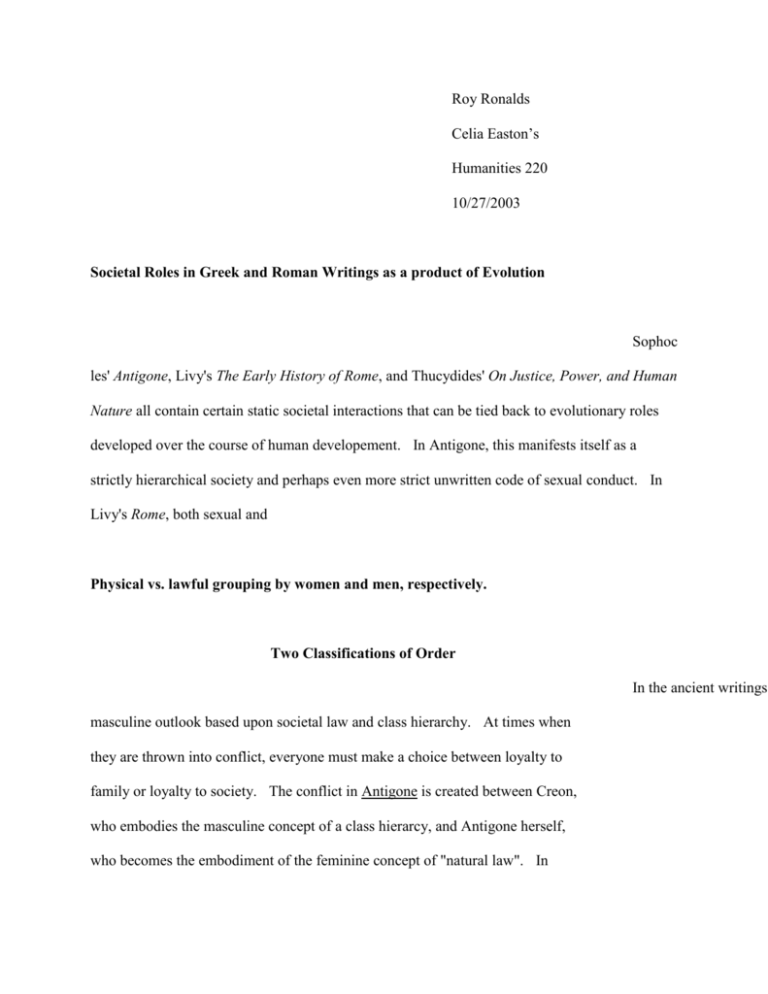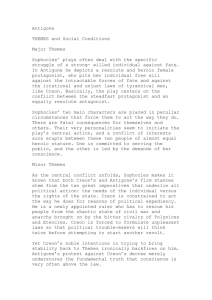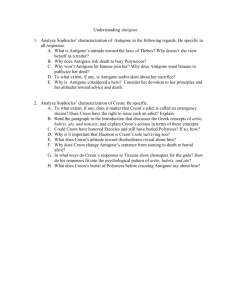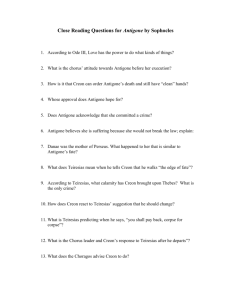
Roy Ronalds
Celia Easton’s
Humanities 220
10/27/2003
Societal Roles in Greek and Roman Writings as a product of Evolution
Sophoc
les' Antigone, Livy's The Early History of Rome, and Thucydides' On Justice, Power, and Human
Nature all contain certain static societal interactions that can be tied back to evolutionary roles
developed over the course of human developement. In Antigone, this manifests itself as a
strictly hierarchical society and perhaps even more strict unwritten code of sexual conduct. In
Livy's Rome, both sexual and
Physical vs. lawful grouping by women and men, respectively.
Two Classifications of Order
In the ancient writings
masculine outlook based upon societal law and class hierarchy. At times when
they are thrown into conflict, everyone must make a choice between loyalty to
family or loyalty to society. The conflict in Antigone is created between Creon,
who embodies the masculine concept of a class hierarcy, and Antigone herself,
who becomes the embodiment of the feminine concept of "natural law". In
"Rome" they form an integral part of the everything from the nursing of the
brothers to Lucretia's rape in the first book of the history. These outlooks exist in
the present day as well as in ancient writings, and are therefore useful for gaining
the start of an understanding of modern principles of loyalty.
Creon's precedence of
he declares of Antigone that "There's no room for pride, not in a slave, not with
the lord and master standing by." (Ant: pg 83 Line 534-535). Creon displays a
pitiless nature even with respect to kin when he declares that whether "Sister's
child or closer in blood than all my family clustered at my altar worshipping
Guardian Zeus, she'll never escape, she and her blood sister, the most barbaric
death." (Ant: pg 83, Line 542-546) and he is unyeilding to the needs of his own
son, from whom he expects only blind oedience, saying "That's how you ought to
feel within your heart, subordinate to your father's will in every way." (Ant: pg
93, Line 713-714). Creon's pride even leads him to angrily reject the first
warning of Tiresias, the representative of the wills of the gods' themselves, when
the old, blind seer tries to turn him from his inflexible path, since "that man the
city places in authority, his orders must be obeyed, large and small, right and
wrong." (Ant: pg 94, Line 746-751). Most telling, however, is his statement
"...never be rated inferior to a woman, never." In the end, that may be the most
overpowering factor in his punishment of her defiance, and the protection of his
pride from being brought to submission by the will of a woman.
Antigo
ne, on the other hand, is so attached to her family that she values her dead kin over her own life
and the lives of others. Blinded by the destruction of her family, the death of her two brothers
being only the lastest blow, she willingly sacrifices herself, never considering the full effects that
it will have upon the future of what remains of her family and Creon's. When faced with
Creon's death sentence, she asks "Who on earth, alive in the midst of so much grief as I, could
fail to find his death a rich reward?" (Ant: pg 82, Line 516-518). She never mentions Haemon,
to whom she was engaged to marry, since as the Creon's son, she probably never entertained the
idea that he might have taken up the cause of his future wife over his father's, but Haemon's
connection to her is strong enough to make him warn his father that Creon "...will never see me,
never set eyes on my face again." (Ant: pg 99, Line 855). Antigone forbids Ismene from
sacrificing herself as well, if a bit unkindly because of Ismene's willingness to bow to the law
over kinship, saying "You chose to live, I chose to die." (Ant: pg 88, Line 626) but she never
considers what Ismene will be left to live with after the death of her last family. And finally, in
her own willingness to die, she casts Creon as the beast that will go down with blood on his
hands, using taunts, saying "...why delay? Your moralizing repels me, every word you say pray god it always will." (Ant: pg 84, Line 557-558) and calling him a tyrant, (Ant: pg 84, Line
566) to ensure that he will play his role.
In
book I of Rome, nearly all of the subplots portray a feminine idea that holds to a family moral,
while the masculine ideal works within a societal law to try to construct a society.
Horatius was willing to kill his own sister for mourning her lover, because Horatius, identifying
with Rome, can only view those who oppose Rome as enemies, and had seperated her lover into
the category of enemy, saying "So perish all women who mourne for an enemy." (Rome: 1.26).
Romulus and his men attempt to create a family by imposing a new home and new husbands
forcefully upon the Sabine women, and eventually by attempting to destroy the women's ties
back to the families of their parents when the Women's fathers seek to do war in order to free
their daughters. It is the Sabine Women, however, who truly allow both groups to meld,
endangering their bodies and with them any chance of a new generation, by placing themselves
in harms way between their fathers and husbands, forcing the warriors to recognize the physical
bond that linked them to each other despite their animosities.
Servius organizes his subjects according to economic classes, making a stratified hierarchy by
which to quantify and order people. Numa created within his government a law of knowledge,
useful methods of categorizing, classifying, and
Tarquin the Proud also mirrors Creon when he refuses Servius, his own father, the rites of burial.
At the end of the first book of Rome, Lucretia's rape is an act that destroys her will to live
because it will break any future for her family, her blood, since she has become tainted with the
possibility of either a bastard child, or simply a child that would be suspected of being a bastard.
After her physical purity of lineage is destroyed, she commits suicide. Since her husband and
father are left only with the task of dealing with their failure to protect their family by tracking
down and killing the rapist, who was the son of the king, they overthrow the power of the king
and his family, creating a new societal law
Conclusion parts:
Even from the first, these distinctions of feminine versus masculine are not simply stereotyped
distinctions of the viewpoints, but rather logical categorizations based upon the physiological
differences between the two sexes, most importantly pregnancy and the uncertainty of paternity,
fact which cause a tendency towards two seperate philosophies of loyalty by the opposite
genders. The mother physically births the next generation, while the father must
environmentally make a family, since paternity has historically been an essentially unprovable
issue.








